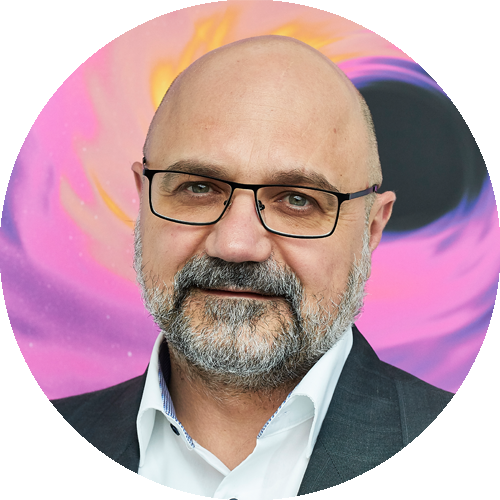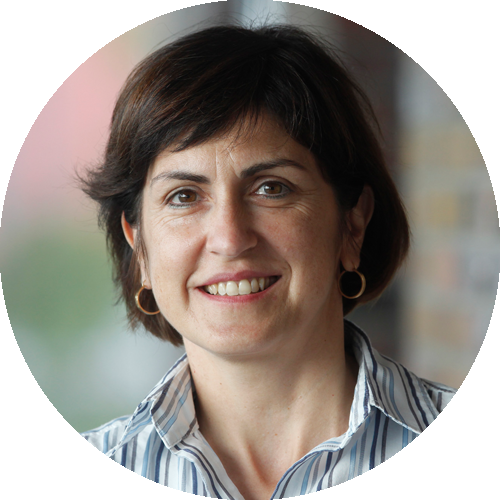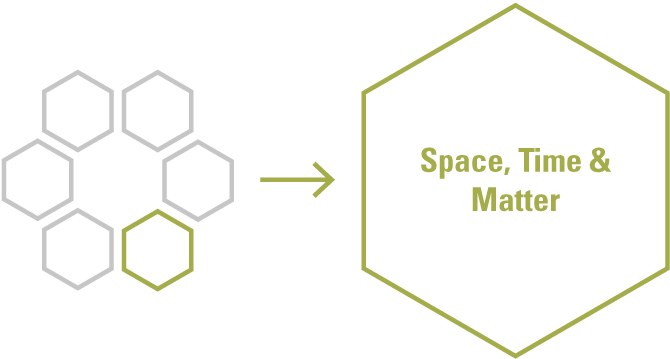- GU Home
- Research at Goethe University
- Profile Area Space, Time & Matter

The profile area "Space, Time & Matter" explores the physical and mathematical foundations of the natural sciences: from the elementary building blocks of matter, to the interaction of the building blocks in solids, artificially producible quantum materials, the atmosphere and Earth's interior, planets and neutron stars. This requires mathematically precise models and efficient algorithms for the numerical exploration.

Profile Area Spokespersons


"Space, time, and matter are the basic building blocks of any scientific
theory and are explored in their most fascinating manifestations in
this Profile Area."
Luciano Rezzolla (Theoretical Astrophysics),
Spokesperson of the Profile Area "Space, Time & Matter"
Spokesperson of the Profile Area "Space, Time & Matter"
Maria Roser Valenti (Theoretical Physics),
Spokesperson of the Profile Area "Space, Time & Matter"
Spokesperson of the Profile Area "Space, Time & Matter"

Key Research Areas

Matter under extreme conditions
investigates the extreme temperature, density, and gravity present in the early universe and in the interior of compact stars. It does so by using the collisions of heavy ions at CERN-LHC and GSI-FAIR, or of neutron stars.
Structure, properties and processes in the deep earth
investigates the properties of matter on earth at extreme temperatures and pressures, deriving a quantitative understanding of large-scale processes, such as magmatism and tectonics.
Condensed matter and quantum materials
investigates novel phenomena resulting from a coupling between elastic properties of quantum materials and their electronic quantum phases, as well as many-body phenomena in quantum matter and synthetic quantum matter.
Light-driven processes in atoms, molecules and organisms
investigates light-matter interaction in atoms, molecules, solids, and biological systems. Using light, it develops methods to control processes in complex systems.

Coordinated Research Projects
DFG (German Research Foundation)
- CRC/TRR 211 "Strong-interaction Matter under extreme Conditions"
- CRC/TRR 288 "ELASTO-Q-MAT - Elastic Tuning and Response of Electronic Quantum Phases of Matter"
- CRC/TRR 301 "TPChange - The Tropopause Region in a Changing Atmosphere"
- CRC/TRR 326 "GAUS - Geometry and Arithmetic of Uniformized Structures"
- FOR 2414 "Artificial Gauge Fields and Interacting Topological Phases in Ultracold Atoms"
- FOR 2975 "AYDN - Algorithms, Dynamics, and Information Flow in Networks"
- FOR 5249 "QUAST - Quantitative Spatio-Temporal Model-Building for Correlated Electronic Matter"
- FOR 5368 "ARENA - Abstract Representations in Neural Architectures"
Associations
- CRC 1319 "ELCH - Extreme light for sensing and driving molecular chirality" (Kassel University)
- CRC 1487 "Iron upgraded!" (TU Darmstadt)
- CRC/TRR 109 "Discretization in Geometry and Dynamics" (TU Berlin)
- CRC/TRR 181 "Energy Transfers in Atmosphere and Ocean" (University of Hamburg)
BMBF (Federal Ministry of Education and Research)
Research Network 05P2021:
ErUM-FSP T01 "Run 3 of ALICE at LHC"
ErUM-FSP T06 "Setup of CBM at FAIR"
ErUM-FSP T05 "Setup of APPA at FAIR"
R&D Accelerator Hadron Linacs
Distinguished Individual Researchers
ERC Grants
- Starting Grant "3DTunneling - Tunnel ionization in three-dimensional tailored light fields" (Sebastian Eckart, FB 13)
- Starting Grant "HIPMAT - High-pressure nitride materials: towards the controllable and scalable synthesis in a diamond anvil cell" (Maxim Bykov, FB 14)
- Advanced Grant "JETSET - Launching, propagation and emission of relativistic jets from binary mergers and across mass scales" (Luciano Rezzolla, FB 13)
Emmy Noether Junior Research Groups
- "High-pressure chemistry of nitrogen-rich compounds" (Maxim Bykov, FB 14)
- "Solving the paradox of the Fe-O system to understand the mineralogy of deep planetary interiors“ (Elena Bykova, FB 11)
- "Stochastic dynamics in parasite evolution" (Cornelia Pokalyuk, FB 12)
Heisenberg Programme
- Fellowship "Crust-mantle evolution and deep volatile cycles through time" (Sonia Aulbach, FB 11)
Institutions involved
GRADE Centers
Institutions of Goethe University
- CSC - Center for Scientific Computing
- FIERCE - Frankfurt Isotope & Element Research Center
- Taunus Observatory
Cooperating Institutions
- Studying at Goethe University
- International applicants
- Faculties
- Overview of study programmes
- Programme for refugees
- GRADE
- Goethe Business School (continuing education)
- Research at Goethe University
- Scientific news
- Goethe Welcome Center (for international researchers)
- Collaborative research projects
- Individual research
- Visiting fellowships
- Endowed chairs
- About the University
- News-in-brief
- University administration
- Campus locations
- Campus life
- University archives (German)
- Rhine-Main-Universities












